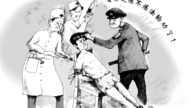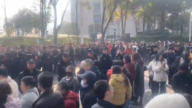【新唐人2014年09月24日訊】中國民間教育公益機構立人鄉村圖書館理事會,日前發出公開信表示,由於受到中共有關當局長期以來的騷擾和打壓,不得不主動停止圖書館運行。那麼立人圖書館遭受了怎樣的打壓?當局到底為甚麼要打壓一個民間公益組織?我們來看看。
9月18號,立人鄉村圖書館召開董事會,宣佈自當日起,立人鄉村圖書館停止運營。同時還發出公開信,向多年來逼迫立人圖書館,關停分館,非法扣留圖書,威脅甚至遣返員工志願者的有關當局,進行抗議和譴責。
公開信中說,從2011年起,立人圖書館開始遭遇巨大壓力,導致多個分館關閉或搬遷。2012年,圖書館所受壓力全面升級,有關部門頻繁給房東施壓,在圖書館對面安裝攝像頭,甚至使用黑社會上門威脅,到去年,迫使8個分館先後關閉。
今年6月開始,立人圖書館的信息平臺和招募通道、以及籌款渠道也都先後遭到關閉。9月初,立人圖書館全部分館,在同一時段,被多個部門連續上門「檢查」,在沒有「檢查」出任何問題的情況下,各地合作方迫於壓力,陸續要求解除與立人的合作關係。9月4號起,全國各地圖書館在10天內相繼遭到關閉。
其中河南張國棟圖書分館,是立人圖書館發起人之一張大軍自家的房子。這個館被河南當地民政局發文「取締」後,當地政府又將駐守該館的志願者遣返家鄉,同時,將圖書館超過萬冊藏書非法搬走。至此,立人圖書館的20個分館遭到關閉。9月18號,立人圖書館理事會,決定解散剩下的最後2間分館。
《亞洲新聞週刊》總監黃金秋:「作為民間的圖書館,更多的是傳播知識,傳播真相,官方的圖書館過濾真相,篡改歷史,按照它的意識形態去灌輸鬥爭觀念,灌輸敵我矛盾的思維。圖書館的被關閉,更加證明它兩個方面的虛弱,第一,對它自己洗腦失控的恐懼,第二,對民間活動的恐懼。」
原河北人民廣播電臺編輯朱欣欣:「這樣做,只能使大家對中共這種專制的虛偽的本質,有更清醒的認識,不會對它寄予甚麼幻想。我們的權利就應當主動去爭取,否則我們的權利會一步一步的被侵蝕,生存的空間會越來越狹窄。」
立人鄉村圖書館成立於2007年,當時北京大學碩士畢業生李英強及其朋友,感慨於中國鄉鎮文化貧瘠的現實,決意投身鄉村圖書館公益事業。7年來,先後在全國12個省市建立了22個分館。在文化凋零、圖書館稀少的縣鄉地區,立人分館在當地受到一些讀者的歡迎。
朱欣欣:「圖書館作為一個公益事業,政府應當扶植,但是它不應當壟斷,圖書館的內容不應當過度的干涉,壟斷的文化只能成為專制權力的附屬品,只能是用來愚弄人民,造成整個社會基本常識的缺乏,扼殺了人們思維的創新,中國好像有很多科學家知識份子,但是很少有原創性的創造,跟文化專制是絕對有關係的。」
公開信中說,鄉村圖書館從成立之日起,為了避免被構陷,從來沒有主動申請國外資助,也幾乎沒有得到過國外資金支持,一直堅持財務的完全透明。當局對立人的打壓是違背國法天理良心的。
而據《法廣》報導,一位關注立人的媒體人透露,此前曾有同事想去採訪立人,半路上被省委宣傳部打電話召回來,原因是這個圖書館被認定為「境外反動勢力」,有「國家安全問題」。
立人圖書館創辦人李英強,目前還是堅持不接受外媒採訪。
立人圖書館創始人李英強:「沒有甚麼罪名。很抱歉,因為我們對外媒一般不接受採訪的,確實是謝謝你,(但是)像立人這種事情,沒辦法解決,我也沒有甚麼期待。」
立人圖書館原本希望,在鄉村能堅持三五十年,為鄉村教育和文化帶來真正的變化。但目前風暴來臨,他們的這一願望,看來已無法實現。
採訪編輯/劉惠 後製/陳建銘
CCP Forces Closures of NGO Liren Libraries
The Liren Village Library Board—China’s non-government
organization (NGO)—recently issued an open letter that said,
the library would close down, due to long-term harassment
and pressure from the Chinese Communist Party (CCP).
What kind of suppression did Liren Library suffer?
And why does the CCP suppress a non-profit organization?
Sept. 18—The Liren Village Library held a board meeting,
announcing that it would stop operating from that day.
It also issued an open letter condemning and protesting
against the CCP after years of suppression, including their
shutting down of library branches, illegally detaining books,
and threatening and repatriating employees and volunteers.
The open letter stated that in 2011, Liren Library began
facing tremendous pressure, which caused multiple branches
to close or relocate, since 2012 the severity had worsened.
The authorities frequently put pressure on the landlord,
installed cameras across the library and even utilized
underhanded means to threaten them, so that by 2013,
eight branches had been forced to close.
In June this year, the library’s information platform
and its recruitment and fundraising channels were closed.
In September, all Liren library branches were investigated,
and even though the inspection returned no results,
local library partners were forced to cut off their partnerships.
Since Sept. 4, all branches of Liren Library across China
have been forced to shut down, within a matter of 10 days.
Henan’s Zhang Guodong branch was located at the house of
Zhang Dajun—one of the founders of Liren Library.
After it was banned by the local Civil Affairs Bureau,
the local government sent its volunteers home
and more than 10,000 books were illegally removed.
All 20 Liren Library branches have now been closed,
with the last two remaining being dissolved on Sept.18.
Asiaweek director, Huang Jinqiu: “As an NGO library,
they help spread knowledge and truth to people."
“Official libraries mainly filter the truth, distort history,
and instill the concept of contradiction and fighting,
according to the CCP’s ideology of struggle."
“The closures of the NGO libraries proves such weaknesses:
first—the CCP’s fear of losing control over its brainwashing,
and second—its fear of civil activities."
Zhu Xinxin, former editor, Hebei People’s Broadcasting:
“This only gives us a better understanding of the CCP’s
hypocritical nature so we won’t have any misconceptions;
we should take initiative to fight for our rights, otherwise
our rights will be taken away one by one
and our life privileges will become increasingly diminished."
Liren Village Library was founded in 2007 by Li Yuingqiang
—a Beijing University master’s graduate—and his friends.
They saw a lack of culture in Chinese communities
and dedicated themselves to setting up libraries in rural areas.
In seven years, they had set up 22 branches in 12 provinces;
they were welcomed in areas with poor cultural heritage.
Zhu Xinxin: “Libraries are important for public welfare
and the government should support this system;
it shouldn’t be a monopoly and library content shouldn’t be
interfered with—that’s cultural tyranny."
“The authorities only try to fool people, causing a lack of
basic knowledge throughout society and repressing people’s
innovation; so China has a lot of scientists and intellectuals,
but there’s little originality."
Liren Library says, since it opened, it had never applied for
foreign funding and rarely received foreign financial support
so as to avoid being framed; it was also totally transparent
financially—the CCP’s suppression is just immoral.
Radio France Internationale reported that, one media who’d
wanted to interview Liren Library had been stopped by
the provincial propaganda department, who called the library
a “foreign reactionary" and a “national security threat."
Liren Library founder Li Yingqiang still can’t accept
foreign media interviews and has refused to say
whether the authorities have any charges against the library.
Liying Jiang, Liren Library founder: “No charges;
sorry, we generally don’t accept foreign media interviews."
“I really want to thank you, but for these kind of things,
there’s no solution; I have no expectations."
Liren Library founders had hoped to bring real changes
to rural education and culture in the countryside
within 30-50 years; but that hope now seems unachievable.
Interview & Edit/LiuHui Post-Production/Chen Jianming






























